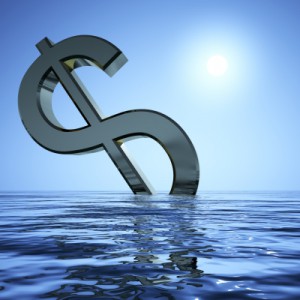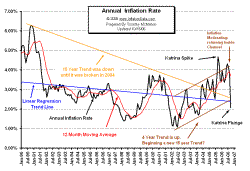Editor’s Note: In the following article Robert Prechter shows you how to prepare for a deflation. By Robert Prechter, CMT The ultimate effect of deflation is to reduce the supply of money and credit. Your goal is to make sure that it doesn’t reduce the supply of your money and credit. The ultimate effect of depression is financial ruin. Your goal is to make sure that it doesn’t ruin you. Many investment advisors speak as if making money by investing is easy. It’s not. What’s easy is losing money, which is exactly what most investors do. They might make money for a while, but they lose eventually. Just keeping what you have over a lifetime of investing can be an achievement. That’s … [Read more...]
Making Preparations and Taking Action in Today’s Deflationary Environment
Editor’s Note: In the following article Robert Prechter shows you how to prepare for a deflation. By Robert Prechter, CMT The ultimate effect of deflation is to reduce the supply of money and credit. Your goal is to make sure that it doesn’t reduce the supply of your money and credit. The ultimate effect of depression is financial ruin. Your goal is to make sure that it doesn’t ruin you. Many investment advisors speak as if making money by investing is easy. It’s not. What’s easy is losing money, which is exactly what most investors do. They might make money for a while, but they lose eventually. Just keeping what you have over a lifetime of investing can be an achievement. That’s … [Read more...]
Disinflation – What is it?
Definition of Disinflation By Tim McMahon To fully understand disinflation we need to first understand inflation. The reasons this is trickier than it first appears is because the word inflation is actually used in two different contexts. The most common usage of the word inflation means rising prices. Commonly "consumer prices" so when you go to the gas station or the grocery store and the things you buy cost more than last month (or when it is really bad even more than last week) this is more precisely defined as "price inflation". The second meaning of the word inflation is actually the original meaning. And that is an increase in the money supply that causes "price … [Read more...]
Will the $800 Billion Bailout Cause Massive Inflation?
Last month I said that the simulated M3 measure of the money supply was indicating that deflation was in the works. See M3 is Back and Predicting Deflation. So how will a massive injection of almost $1 Trillion dollars affect the money supply? If you have read any of the articles on inflation on this site you will realize that the primary cause of price inflation is monetary inflation. In other words, if the government cranks up the printing presses the price of almost everything goes up. For more information see What is Inflation? and Inflation Cause and Effects. So you would think that it is only obvious that a massive injection of money like the recent $800 Billion bailout … [Read more...]
Why would Gold fall during an Investment Crisis?
Editor's Note-- In the article Is Gold really a good Inflation Hedge? I said, Gold is actually a "crisis hedge." So it should be performing extremely well with all the uncertainty in the markets right now. In this article Andrew Gordon explains how gold is currently in limited supply and demand is booming due to the crisis and what is currently affecting the price. -- Tim McMahon, editor Has Gold Lost its Investment Luster? By Andrew Gordon Gold dropped from $915 to $859 on Friday [October 10, 2008]. That’s not supposed to happen while the market is crashing. What’s going on? … [Read more...]
What is Deflation?
Define Deflation: In common usage deflation is generally considered to be "falling prices". But there is much more to it than that. Often people confuse deflation with disinflation or with Depression (as in "the Great Depression"). These three terms are related but not synonymous. According to Investorwords.com the definition of Deflation is "a decline in general price levels, often caused by a reduction in the supply of money or credit. Deflation can also be brought about by direct contractions in spending, either in the form of a reduction in government spending, personal spending or investment spending. Deflation has often had the side effect of increasing unemployment in an economy, … [Read more...]
How can we have Inflation and Deflation at the same time?
In common usage, deflation is generally considered to be "falling prices" while Inflation is "rising prices". Actually this is "price inflation" as opposed to "monetary inflation". For more information see What is Deflation? and What is Inflation? and Inflation Cause and Effects. So if inflation is rising prices and deflation is falling prices, how can prices rise and fall at the same time? Somehow that seems counter intuitive. Obviously, when the Bureau of Labor Statistics comes up with the Consumer Price Index it is either higher or lower than the month before so we have inflation or deflation. But that is the number for the whole economy, it includes over 10,000 items and … [Read more...]
Inflation Falls by Half – As Hurricane Katrina Effects Wear Off
At 2.06% September's Annual Inflation rate came in at almost exactly half of the 4.15% Annual rate that existed only two months earlier in July. But does that mean that all of our inflation worries are over, the FED’s tightening has worked and all is right with the world? Not Hardly! I certainly wish we were reentering the days of low inflation, low interest rates and a recovering economy. But that is not the case this month. What we have is a simple rebound effect from… believe it or not… Hurricane Katrina. It is hard to believe but the one year anniversary of Hurricane Katrina has passed. With it’s passing we have the spike in prices that it caused passing too. The interesting … [Read more...]
Hurricane Katrina: The Economics of Disaster
The Economics of Disaster: Are Hurricanes Inflationary or Deflationary? Insurance companies have estimated the damage from hurricane Katrina at $25 Billion Dollars. But the economic effect is much greater than that. That is just the loss of property. Another consideration is the loss of revenue while things are being rebuilt. What about the loss of jobs from the companies who won’t be rebuilding because they didn’t have insurance? According to the “Financial Times” current estimates of “total economic losses” are closer to $100 Billion. Those numbers are so large that it is almost impossible for us to get our minds around it. If you stacked 100 billion one dollar bills on top of each … [Read more...]




